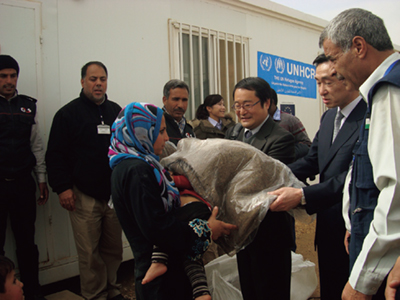Section 2 A New Initiative: The Humanitarian, Development and Peace Nexus

Support for Syrian refugees and host communities through cooperation with the United Nations High Commissioner for Refugees (UNHCR) and the Japan International Cooperation Agency (JICA) (Jordan) (Photo: JICA)
The humanitarian-development nexus has functioned effectively in the ways described above. However, this is an ex post facto approach after an outbreak of a humanitarian crisis. It is becoming increasingly imperative to place the focus not only on post-conflict response, but also on efforts to prevent the occurrence or recurrence of the conflicts that give rise to humanitarian crises, and to address the root causes of conflicts through means such as nation-building and social stabilization during peacetime. To achieve this, Japan has added the element of “peace” to the humanitarian-development nexus, and will focus on the “humanitarian, development and peace nexus.”
To be specific, Japan will continue providing assistance based on the concept “humanitarian-development nexus” in the early stages of the conflict period and will seamlessly move into assistances for peace-building and conflict prevention as well as economic development and poverty eradication [once a humanitarian crisis begins] once settlement and repatriation of refugees and IDPs becomes possible. Some examples of such support include support for disarmament, demobilization, and reintegration (DDR), development of legal and judicial systems, public safety and security, disposal of landmines and unexploded ordnance, and capacity building of peace-building actors. Japan believes that our past experiences in assisting Asian countries will be useful to harness its experiences from initiatives implemented in Asia, to provide support in these areas.
A specific example would be Uganda, which is experiencing a mass influx of refugees from South Sudan. In addition to providing humanitarian assistance such as supplying food to refugees, Japan has also conducted rice cultivation seminars and vocational training programs through international organizations, and provided technical cooperation through JICA, with the aim to support host communities and of building self-reliance of refugees. This initiative not only aims to strengthen social cohesion between refugees and the residents of neighboring areas of refugee camps, but also gives ways for refugees to establish their livelihoods smoothly upon return to their home countries in the future. Such approach is expected to contribute to peace-building and preventing the recurrence of conflicts.
To achieve sustained peace, Japan is pushing forward on such initiatives by strategically and actively utilizing the ODA - which is its strength - in a way that meets the needs and situation of the respective countries. By doing so, Japan aims to make its utmost contribution towards achieving the SDGs, in which it seeks to bring about the realization of a society where no one, including the most vulnerable, will be left behind.
